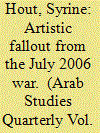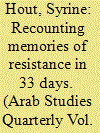| Srl | Item |
| 1 |
ID:
153219


|
|
|
|
|
| Summary/Abstract |
A decade after the end of Israel's 2006 war on Lebanon, I spotlight the hitherto under-researched literary portrayals of the conflict. Following an overview of the immediate and (then-) innovative media tools and techniques used to capture its momentum—blogging, video-making, and online comics—and of Arabic-, French-, and English-language literary writings referring to the war, I focus on how literature, which requires time for its “contents” to be distilled into a form removed from emotional immediacy, succeed not only in reflecting it but also in reflecting on it through various fictional(izing) prisms. I do so by comparing the methodologies adopted by Nada Awar Jarrar's A Good Land and Abbas El-Zein's Leave to Remain: A Memoir, both published in 2009, and by arguing that they share a sense of guilt and hence exhibit an ethical exigency by incorporating particular discourses to mediate and mediatize this war as crisis: the social/humanitarian in A Good Land and the visual/photographic in Leave to Remain.
|
|
|
|
|
|
|
|
|
|
|
|
|
|
|
|
| 2 |
ID:
145619


|
|
|
|
|
| Summary/Abstract |
In this article, I examine the only entirely fictional film made so far about Israel's July 2006 war on Lebanon: the Lebanese-Iranian film 33 Days (2012). I demonstrate how this cinematic intervention, centered on the real-life Battle of Aita al-Shaab, provides a counter-hegemonic narrative to the mostly Western and largely orientalist views not only of this war but of the history of conflict between two opposed political imaginaries: the Israeli on the one hand and the discourse of resistance on the other. I argue that the film's featuring a web of different types of intersecting memories—personal and collective, traumatic and inherited (post-memories)—of both Lebanese and Israeli characters is instrumental for (re)defining resistance as an ongoing project with both a historical trajectory and an eye to the future of Arab-Israeli armed conflict. While memories are used to recount parts of the (hi)story of combat against Israeli offensives, they also force Israeli commanders to recount, i.e., to recalculate, their own tactics and strategies as they encounter an unwavering and surprising opponent.
|
|
|
|
|
|
|
|
|
|
|
|
|
|
|
|